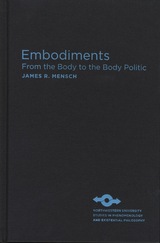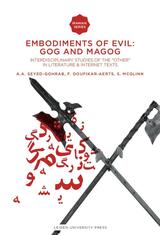2 books about Embodiments

Embodiments
From the Body to the Body Politic
James R. Mensch
Northwestern University Press, 2009
How does the body politic reflect the nature of human embodiment? To pursue this question in a new and productive way, James Mensch employs a methodology consistent with the fact of our embodiment; he uses Merleau-Ponty’s concept of "intertwining"—the presence of one’s self in the world and of the world in one’s self—to understand the ideas that define political life.
Mensch begins his inquiry by developing a philosophical anthropology based on this concept. He then applies the results of his investigation to the relations of power, authority, freedom, and sovereignty in public life. This involves confronting a line of interpretation, stretching from Hobbes to Agamben, which sees violence as both initiating and preserving the social contract. To contest this interpretation, Mensch argues against its presupposition, which is to equate freedom with sovereignty over others. He does so by understanding political freedom in terms of embodiment—in particular, in terms of the finitude and interdependence that our embodiment entails. Freedom, conceived in these terms, is understood as the gift of others. As a function of our dependence on others, it cannot exist apart from them. To show how public space and civil society presuppose this interdependence is the singular accomplishment of Embodiments. It accomplishes a phenomenological grounding for a new type of political philosophy.
Mensch begins his inquiry by developing a philosophical anthropology based on this concept. He then applies the results of his investigation to the relations of power, authority, freedom, and sovereignty in public life. This involves confronting a line of interpretation, stretching from Hobbes to Agamben, which sees violence as both initiating and preserving the social contract. To contest this interpretation, Mensch argues against its presupposition, which is to equate freedom with sovereignty over others. He does so by understanding political freedom in terms of embodiment—in particular, in terms of the finitude and interdependence that our embodiment entails. Freedom, conceived in these terms, is understood as the gift of others. As a function of our dependence on others, it cannot exist apart from them. To show how public space and civil society presuppose this interdependence is the singular accomplishment of Embodiments. It accomplishes a phenomenological grounding for a new type of political philosophy.
[more]

Embodiments of Evil
Gog and Magog: Interdisciplinary Studies of the "Other" in Literature & Internet Texts
Edited by A. A. Seyed-Gohrab, F. Doufikar-Aerts, and S. McGlinn
Leiden University Press, 2011
One Word – Yak Kaleme was one of the first treatises in the Middle East to demonstrate that Islam is compatible with the introduction of modern western forms of government, and specifically that the principles of the sharia can be incorporated in a codified law comparable to that found in European countries. This was a daring argument in the late 19th century, when it was extremely difficult to convince the rulers and religious class that a civil code of law was needed: would it not diminish the status of the ruler, and would it not be an admission that the religious law, the sharia, was deficient?
The author, Mirza Yu¯suf Kha¯n Mustashar al-Dawla (d. 1895), was a liberal-minded bureaucrat campaigning for reform of the absolutist system and the creation of one based on European principles of government. He held several posts abroad including St Petersburg (1854-62), and Paris (1867-71), as well as carrying out administrative duties in Iran itself.
In One Word he argues that the principles underlying constitutional government can be found in Islamic sources, particularly in the Quran and traditions of the Prophet. Unlike some Oriental travellers to Europe at that time, he observed that European dominance was not derived from a few technological advances, but primarily from the organisation of society, on the basis of codified law. One Word was a significant text in the lead-up to the Iranian Constitutional Revolution of 1906, but its message is relevant today.
[more]
READERS
Browse our collection.
PUBLISHERS
See BiblioVault's publisher services.
STUDENT SERVICES
Files for college accessibility offices.
UChicago Accessibility Resources
home | accessibility | search | about | contact us
BiblioVault ® 2001 - 2024
The University of Chicago Press









